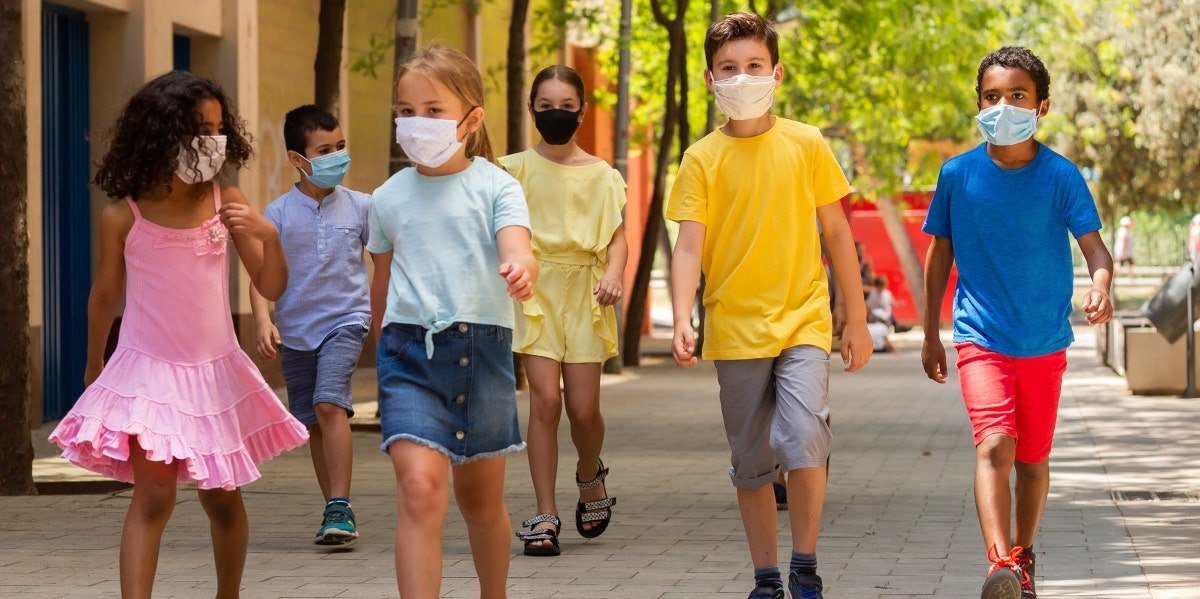5 Ways To Foster Basic Social Skills For Kids Going Back To In-Person School
Support your child as they re-learn basic social skills.
 Iakov Filimonov / Shutterstock
Iakov Filimonov / Shutterstock Fostering basic social skills for kids is now more important than ever as school gradually returns to in-person.
It’s been about three weeks since your children returned to school buildings. How is the new normal treating your family?
For most, this is the first time since schools closed in March 2020 that your children have had a full-time, in-person schedule.
RELATED: Essential Mental Health Tips For Kids & Parents Finally Going Back To School This Fall
Most parents and teachers are cautiously monitoring the children. How are they holding up — academically and socially — while in new classroom arrangements that no longer offer grouping or indoor lunches?
How do you help young people relearn basic social skills for the rapidly changing world? Do you need to support your child as they relearn basic social skills?
I argue that students need to return to the classroom for the development of critical social skills as well as their mental and physical health.
Depending on the age of the child, some may not have been in a school building for two years. As students and adults adjust, parents should "slow the roll" and help children re-adjust, gradually. Some children may need to be retaught basic social skills.
Here are 5 ways to foster basic social skills for kids going back to in-person school.
1. Ensure your child knows how and when to ask for help.
Knowing how and when to ask for help is a critical, yet surprisingly complicated, life skill. Children first must recognize when they need help and then manage their feelings that may get in the way.
They may feel they ask too many questions already, that the timing is wrong, or even that they may appear "stupid."
Should they move forward communicating their needs, they need to predict the likely reaction and clearly communicate their needs. Help your child by thinking through potential issues when they are at home and feeling safe.
Coming up with relevant plans can empower children to get the help they need. Practicing the simple question, "Is now a good time for me to ask for help?" can help a reluctant child ask for the help they need.
2. Learn how to resolve a problem with a peer.
Conflict resolution is a key component of socialization that most encounter on a daily basis. Help your child prepare to deal with conflicts in advance.
Many children and teens have difficulty communicating their feelings without allowing emotions to take over the conversation. Work with your kid on how to get a positive conversation started.
Model a pretend conversation to practice positive, productive communication regularly. This life skill prepares children to make, strengthen, and salvage relationships.
3. Practice joining groups.
Being able to approach other people is a key skill, yet it's not an easy one for many kids. Practice with your child at home — with siblings or neighbors — on how to join a group.
Have your child first pause before heading toward the group to read people’s body language.
Find someone who is physically opened up so they can navigate into the group and then make eye contact with this person. A welcoming smile followed by a nod or contribution to the dialog will hopefully make this transition comfortable.
Suggest your child take on a role in a group, such as a yearbook photographer. This is a natural way to approach someone or a group.
Being a member of a group or team will help your child get to know others. Help your child develop a pre-game for those days when all of these emerging skills feel daunting.
4. Provide emotional support.
Before things escalate, help your child or teen recognize the signals for frustration and learn how to allow time to cool off. Due to immaturity or lack of experience in dealing with conflict, emotions can take over quite abruptly.
Providing paper and pencils in a "safe" location encourages children to write down, sketch, or draw their feelings. Guiding questions or a visual can help gauge the level of emotional support needed.
A child’s brain typically only recognizes one perspective: their own. Practice perspective-taking using summarizing or paraphrasing skills. Ask your child to recount their perspective or the scenario and repeat back to them how you understood them.
This allows the child to hear their own thoughts more clearly and helps you better understand the situation.
5. Developing a new generation of leaders.
The next generation will certainly carry a lot of responsibility. The future depends on a new generation of leaders empowered with skills like empathy, resilience, and appreciation for diversity — enabling them to face challenges and find innovative solutions.
As parents and caregivers, you are your children’s first teachers. You are nurturing the leaders of tomorrow. Help your child think about future planning by asking questions such as, "What do you want to be?"
Disrupted routines, social isolation, and food insecurity are just a few of the consequences of COVID-19 that have impacted children. The impact on their mental health may not be fully appreciated for some time to come.
It's your job, as trusted advocates, to protect, prepare and nurture our children by helping them learn basic social skills.
Recognize that it’s only by closing the gaps in students’ social-emotional well-being that they can reach their full academic potential.
Hang tough! We are in this together!
Caroline Maguire, ACCG, PCC, M.Ed. is a personal coach who works with children with ADHD and the families who support them. For more information, visit her website.
